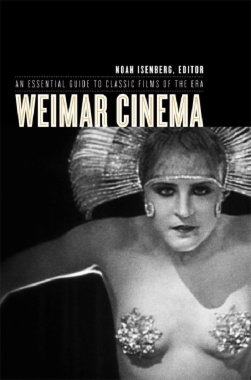Taken as a whole, the sixteen remarkable films discussed in this provocative new volume of essays represent the brilliant creativity that flourished in the name of German cinema between the wars. Encompassing early gangster pictures and science fiction, avant-garde and fantasy films, sexual intrigues and love stories, the classics of silent cinema and Germany's first talkies, each chapter illuminates, among other things: the technological advancements of a given film, its detailed production history, its critical reception over time, and the place it occupies within the larger history of the German studio and of Weimar cinema in general. Readers can revisit the careers of such acclaimed directors as F. W. Murnau, Fritz Lang, and G. W. Pabst and examine the debuts of such international stars as Greta Garbo, Louise Brooks, and Marlene Dietrich. Training a keen eye on Weimer cinema's unusual richness and formal innovation, this anthology is an essential guide to the revolutionary styles, genres, and aesthetics that continue to fascinate us today.
- Contents
- Acknowledgments vii
- Introduction 1
- 1. Suggestion, Hypnosis, and Crime: Robert Wiene's The Cabinet of Dr. Caligari (1920) Stefan Andriopoulos 13
- 2. Of Monsters and Magicians: Paul Wegener's The Golem: How He Came Into the World (1920) Noah Isenberg 33
- 3. Movies, Money, and Mystique: Joe May's Early Weimar Blockbuster, The Indian Tomb (1921) Christian Rogowski 55
- 4. No End to Nosferatu (1922) Thomas Elsaesser 79
- 5. Fritz Lang's Dr. Mabuse, The Gambler (1922): Grand Enunciator of the Weimar Era Tom Gunning 95
- 6. Who Gets the Last Laugh? Old Age and Generational Change in F.W. Murnau's The Last Laugh (1924) Sabine Hake 115
- 7. Inflation and Devaluation: Gender, Space, and Economics in G.W. Pabst's The Joyless Street (1925) Sara F. Hall 135
- 8. Tradition as Intellectual Montage: F.W. Murnau's Faust (1926) Matt Erlin 155
- 9. Metropolis (1927): City, Cinema, Modernity Anton Kaes 173
- 10. Berlin, Symphony of a Great City (1927): City, Image, Sound Nora M. Alter 193
- 11. Surface Sheen and Charged Bodies: Louise Brooks as Lulu in Pandora's Box (1929) Margaret McCarthy 217
- 12. The Bearable Lightness of Being: People on Sunday (1930) Lutz Koepnick 237
- 13. National Cinemas / International Film Culture: The Blue Angel (1930) in Multiple Language Versions Patrice Petro 255
- 14. Coming Out of the Uniform: Political and Sexual Emancipation in Leontine Sagan's Madchen in Uniform (1931) Richard W. McCormick 271
- 15. Fritz Lang's M (1931): An Open Case Todd Herzog 291
- 16. Whose Revolution? The Subject of Kuhle Wampe (1932) Marc Silberman 311
- Filmography 331
- Contributors 341
- Index 345

